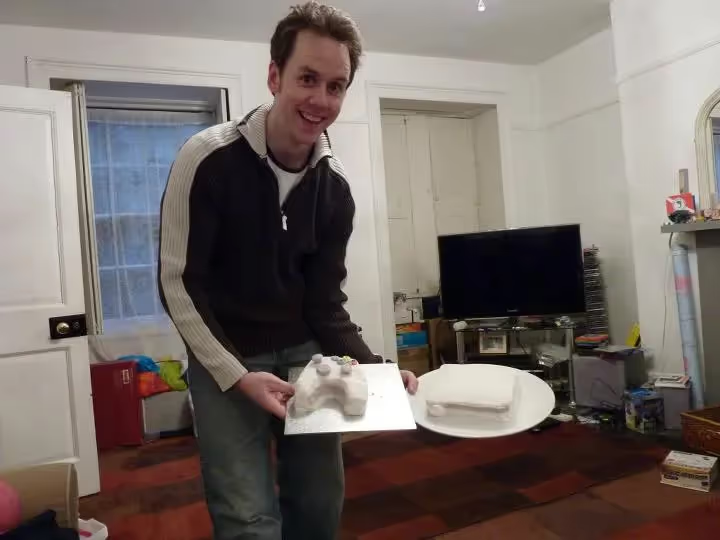Stoic Director Arnie Jorgensen Discusses The Banner Saga Trilogy, Kickstarter, and Throwing Away Seven Months of Work
The Banner Saga Trilogy made its long-awaited appearance on physical media on Friday as it hit the Nintendo Switch. Comprising all three instalments of the RPG series, it is the culmination of six years' solid graft, awards, tears and turmoil. It hasn't been an easy process but the reviews and critical acclaim certainly speak for themselves — we recently covered the third game, and loved it. But how hard was it to get to this point? What sacrifices were made? And what are Stoic's plans for the series — and their studio — in the future?
We spoke to Arnie Jorgensen, Co-Owner of Stoic and the Creative Director of the series to get a behind-the-scenes look at the creation of one of the most successful RPG trilogies of recent times.

***
Jump Dash Roll: Was The Banner Saga always intended to have sequels, and if not, was your immediate thought upon its runaway success: “Wow, now we have to make another”? And was that a terrifying prospect, or one that you were excited about?
Arnie Jorgensen: The Banner Saga was always planned to be a trilogy. It’s got a beginning, middle and end, and the end is what has now been reached. When we originally conceived of the story, a friend of ours told us to break it up into three different games so that it was manageable. Thankfully we took his advice. We’re very satisfied to say that we ended the story, six years after starting, pretty much exactly as we’d first imagined.
JDR: The Banner Saga 2 was the only game in the trilogy which you didn’t use Kickstarter for, and despite being critically acclaimed, the release felt a little muted in comparison to the other two games. Aside from the lack of crowdfunding, how much impact do you think Kickstarter has on the marketing and hype build-up? Would you use it for future projects?
AJ: The crowdfunding aspect of Kickstarter can help, but it’s really the wave of amazing community support that we felt at the launch of The Banner Saga that buoyed Stoic. We made enough money to continue onto Saga 2 without needing any funding and we thought that the community wouldn’t want us to take months out to run another campaign for money we didn’t need. We thought what they really wanted was for us to go heads-down and get Saga 2 out to them as fast as we could. THIS WAS A MISTAKE! We really missed talking to the players and they missed not knowing what was going on in the world of Vikings that they’d invested in. We took a highly motivated community and basically went dark on them. For the third game we went back to Kickstarter and have been very happy we did. Aside from their support and feedback on the game they are also our biggest advocates on the interwebs.

JDR: The Banner Saga Trilogy is being released in a single physical package for the Switch – how long do you think physical media will still be relevant in the gaming world?
AJ: I do not know. I personally have abandoned most physical media, but the Lead Designer sitting next to me buys almost exclusively physical media. He wants to hold that Nintendo Switch game in his hand and know that twenty years from now he can put it into his Nintendo Switch and play it. This cartridge will be there for his grandchildren in a way that the download may not be. I think that makes a lot of sense.
JDR: Releasing three games in four years is quite an achievement — did the games become easier to make with each new instalment? Were you able to keep the same team throughout, and how crunchy did the development process get?
AJ: Thank you for the kind, achievement words, sir! I’m very sorry to say that the games did not become easier to make, in many ways they got harder, but we also had more people on the team to cushion the blow. The first game was made primarily by three guys and the crunch was so bad by the end of it that Alex Thomas, one of the three founding members, quit to do his own thing once we launched. Ouch.
The Banner Saga 2 was a link between the beginning of the story and the end of the story and that’s always hard to make interesting. We also needed to add more systems to help the game evolve as well as making it more polished than the first game overall. The story for Saga 3 was so large because of the divergence of different players' decisions that we went down the wrong road for seven months before throwing it all away and starting over. That was a low point… losing that many months of development for a small indie studio is a tough punch to take, but it was the right decision for the game. We think The Banner Saga will continue to be played by people for decades to come, so we choose to think long-term. The crunch wasn’t bad at all though for Saga 3, very little here and there I’d say. The team has stayed, gotten larger and even Alex Thomas rejoined the team to write the final installment.

JDR: Divinity: Original Sin 2 recently received an enhanced edition which included huge additions and changes to the narrative. Are you satisfied with the way the story in The Banner Saga Trilogy played out, or would you consider a similar approach in the future to address anything you were unhappy about?
AJ: We’re continually fixing bugs and doing small improvements to make the game a better experience for our players, but we have no intention of changing large swaths of the story. There are things I would probably change if I could do it again, but that’s the case with every game or artistic endeavour. No, we’re very happy and content with the way The Banner Saga now stands.
That being said we’re working on some other huge additions to the game. Survival Mode is releasing very soon. It’s a mode where players can play through all the battles from Saga 3, back-to-back, and see if they can survive to the end. There are some different mechanics, like turn order and perma-death in combat at play and also leaderboards for those that really enjoyed the combat in the game.
After this we’ll be launching Eternal Arena, another combat mode, but one that lets the players set up their own combats and rules. They can set up any team to fight against any enemies and we’ll also have weekly tournaments to test their combat mettle. This is a mode that the community has been asking about for a long time and we’re happy they’ll soon get it.

JDR: The trilogy was notably free from microtransactions in an industry which has been relentless in trying to claw as much money from players as it can, even within full-price AAA games. Is this ethos of only paying once something you hold dear, or would you consider adding microtransactions (even for cosmetic items) into future games?
AJ: I think steering clear of microtransactions was the way to go with The Banner Saga. It simply fit that the game should be a one-time-pay. We also didn’t want to do microtransactions because the first game was largely crowdfunded. We’ve discussed and thought a lot about microtransactions and also free-to-play games and I think they’ve come a long way since we started Stoic six-plus years ago. I’m of the opinion that, for better or for worse, the gaming community is voting for what they want to play with their money and daily concurrent numbers. It seems that these are the types of games a large segment of the gaming community want to play. We’re not against using these models in the future, we’ll just have to see if it fits the game.
JDR: When you’re creating three instalments in the same franchise it’s important to evolve not just the story but the gameplay as well, to keep things fresh and get people excited for the next release. Do you have any advice for small studios like you who might find themselves with a massive hit on their hands? How did you approach each new chapter in terms of finding new shiny things to build on what came before? Did the community help?
AJ: My advice to any small studio that finds themselves with a massive hit on their hands is to enjoy it a little, but also save their money: their next title could crash and burn. Most studios can’t get one success out the door let alone two in a row, so save some money for the rainy day.
We added new systems per game through story, so it would naturally evolve for the player and not feel like a hiccup. When we added foraging for the clansmen in Saga 2 it was Oddleif who came to the player saying that many clansmen feel like they’d like to help the caravan more and this was one way they could. When we added wave battles in Saga 3 it was done through the story that the caravan was now fighting legions of the warped who won’t stop coming. Now that all three games are out, players can play them all in one effort and it will feel like one long, evolving game. I think that’s the best way to digest the experience and also the way we originally intended.

JDR: Finally, it must be exciting but perhaps daunting to start thinking about a new game – what are your plans?
AJ: It’s totally exciting, it’s the type of thing that game designers dream of. We’ve got a small team and coming to work every day is a joy because we get to come up with all kinds of cool ideas and run them by each other, cracking up, laughing, whiteboarding fun, YEAH! The daunting part is due to the next game being so large. Many of us came from large scale development before starting the small studio Stoic, and we’re moving back to our roots a bit but keeping the in-depth world building that we’ve become known for. This is going to be a new world, with new gameplay.
We.
Cannot.
Wait.
To show our community what we’re doing next.
***
We would like to thank Arnie for his time, and we can't wait to see where Stoic goes with its next project. Meantime, check out The Banner Saga Trilogy on Nintendo Switch, and let us know in the comments if you're looking forward to the new modes coming out in the near future!
You can subscribe to Jump Chat Roll on your favourite podcast players including:
Let us know in the comments if you enjoyed this podcast, and if there are any topics you'd like to hear us tackle in future episodes!


